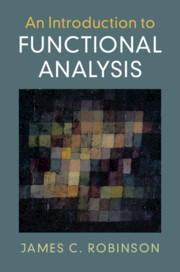Refine search
Actions for selected content:
8 results
2 - Mathematical Preliminaries
- from Part I - Physical and Mathematical Background
-
- Book:
- Causal Fermion Systems
- Published online:
- 15 November 2025
- Print publication:
- 23 October 2025, pp 21-58
-
- Chapter
-
- You have access
- Open access
- Export citation
2 - Elements of Quantum Mechanics I: Closed Systems
- from Part I - Preliminaries
-
- Book:
- Quantum Resource Theories
- Published online:
- 03 May 2025
- Print publication:
- 10 April 2025, pp 23-74
-
- Chapter
- Export citation
Weakly separated Bessel systems of model spaces
- Part of
-
- Journal:
- Canadian Mathematical Bulletin / Volume 65 / Issue 3 / September 2022
- Published online by Cambridge University Press:
- 04 October 2021, pp. 723-742
- Print publication:
- September 2022
-
- Article
- Export citation

An Introduction to Functional Analysis
-
- Published online:
- 21 March 2020
- Print publication:
- 12 March 2020
-
- Textbook
- Export citation
8 - Hilbert Spaces
- from Part III - Hilbert Spaces
-
- Book:
- An Introduction to Functional Analysis
- Published online:
- 21 March 2020
- Print publication:
- 12 March 2020, pp 101-109
-
- Chapter
- Export citation
FORKING AND STABILITY IN THE REPRESENTATIONS OF A C*-ALGEBRA
-
- Journal:
- The Journal of Symbolic Logic / Volume 80 / Issue 3 / September 2015
- Published online by Cambridge University Press:
- 22 July 2015, pp. 785-796
- Print publication:
- September 2015
-
- Article
- Export citation
Covering the Unit Sphere of Certain Banach Spaces by Sequences of Slices and Balls
-
- Journal:
- Canadian Mathematical Bulletin / Volume 57 / Issue 1 / 14 March 2014
- Published online by Cambridge University Press:
- 20 November 2018, pp. 42-50
- Print publication:
- 14 March 2014
-
- Article
-
- You have access
- Export citation
Isometric Group Actions on Hilbert Spaces: Structure of Orbits
-
- Journal:
- Canadian Journal of Mathematics / Volume 60 / Issue 5 / October 2008
- Published online by Cambridge University Press:
- 20 November 2018, pp. 1001-1009
- Print publication:
- October 2008
-
- Article
-
- You have access
- Export citation



